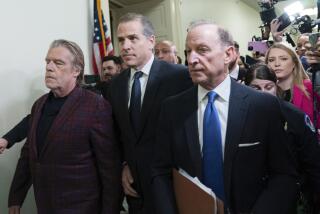Prosecutors Ask for Dismissal of Charges Against 3 in Insider Case : Seek More Time to Prepare a Broader Indictment
NEW YORK — The federal government on Wednesday moved to dismiss its insider trading indictment of three important Wall Street traders, one day after prosecutors conceded that if they were forced to begin trial on the charges next week, as scheduled, they might lose the case.
Prosecutors said they sought the dismissal to give themselves more time to prepare a broader indictment against the traders, but defense lawyers argued that it exposed the federal case as fatally weak.
Lawyers for the defendants--Robert M. Freeman, the top stock arbitrageur at Goldman, Sachs & Co.; Richard B. Wigton, head of arbitrage at Kidder, Peabody & Co., and Timothy L. Tabor, a former arbitrageur at Kidder and at Merrill Lynch & Co.--said they would respond to the motion at a hearing late today, presumably by asking that the dismissal be granted “with prejudice.”
That would bar the government from bringing further charges based on the evidence cited in the original charges.
Approval Expected
The lawyers also indicated they might try to impose a strict deadline on the government’s possible new indictment under the speedy trial act, which requires that most trials begin within 70 days of indictment. The defense lawyers suggested that they might ask that the period continue to be based on the date of the first indictment, April 9.
In any event, U.S. District Judge Louis L. Stanton is expected to approve the dismissal today.
The dismissal motion is the first public setback in the government’s yearlong investigation of trading abuses on Wall Street. The probe has so far produced guilty pleas by several major figures in the securities business, including stock speculator Ivan F. Boesky, institutional stockbroker Boyd L. Jefferies, and mergers-and-acquisitions specialist Martin A. Siegel.
Those successes had contributed to a sense on Wall Street that the investigation by the Securities and Exchange Commission and U.S. Atty. Rudolph W. Giuliani of New York was a juggernaut, which may have helped authorities’ attempts to persuade potential defendants to cooperate with the probe.
The three defendants in this case, however, had insisted on their innocence. They were the only people charged in the investigation so far to demand a trial.
All three were implicated by Siegel, a former investment banker at Kidder, after prosecutors began investigating Boesky’s assertions that he had paid Siegel for confidential information.
Siegel told investigators that he and Freeman regularly swapped confidential information from their own firms, and that Wigton and Tabor knew that his own trading recommendations were based on illegal tips.
The resulting charges electrified Wall Street in part because of the public arrests of Wigton and Freeman in their offices Feb. 12. Wigton, who resisted the federal marshals sent to arrest him, was handcuffed in full view of his underlings on the Kidder trading floor. Tabor had been arrested the evening before and forced to spend the night in jail.
Investigation Continuing
Moreover, the traders were highly respected by their colleagues, although the insider trading charges against Boesky had sullied the image of their business, which involved speculating in takeover-prone stocks.
In moving to drop the April 9 indictment, the prosecutors Wednesday stopped well short of absolving Freeman, Wigton and Tabor of guilt. Instead, Assistant U.S. Atty. Neil S. Cartusciello told Judge Stanton that a federal grand jury was continuing to investigate the traders’ activities and that the government believes “the pending indictment is merely the tip of an iceberg . . . the charges are a mere small fraction of what this case is all about.”
Stanley S. Arkin, the defense lawyer for Wigton, called Cartusciello’s remark “manifest hyperbole.”
“They’ve acknowledged they’ve made a grievous mistake,” he said, “and now they seek to do it in another indictment.”
Arkin and the other defense lawyers complained that the government’s motion could leave their clients in legal and social limbo for years. Theoretically, the government could bring new charges against the traders at any time until the five-year statute of limitations expires--in this case, until 1989 or 1990 on allegedly illicit trades made in 1984 and 1985.
“My client is unemployed,” said Andrew Lawler, Tabor’s attorney. “And now the government, in dismissing its case, states it’s still pursuing the charges, meaning that a cloud remains on my client’s situation.”
Different Scenario
Indications that the prosecution was nearing a crisis have been gathering for some time. The facts alleged in the indictment, for example, differed materially from those alleged in the government’s court complaint issued at the time of the traders’ arrests.
Most striking was the indictment’s new version of the timing of three key options trades by Wigton and Tabor. As the original complaint had it, Siegel had told authorities that he had received an illegal tip in April, 1985, from Freeman that Unocal, a client of Goldman, Sachs, was preparing a takeover defense against a raid by T. Boone Pickens Jr. He said further that Wigton and Tabor had bought options that month on the basis of the Freeman tip.
The indictment, however, placed the options trades in mid-May--three weeks after Unocal’s plans had been made public.
The prosecutors’ problems increased Tuesday when Stanton denied their motion to delay the trial by two months, to July 20.
More to Read
Inside the business of entertainment
The Wide Shot brings you news, analysis and insights on everything from streaming wars to production — and what it all means for the future.
You may occasionally receive promotional content from the Los Angeles Times.










